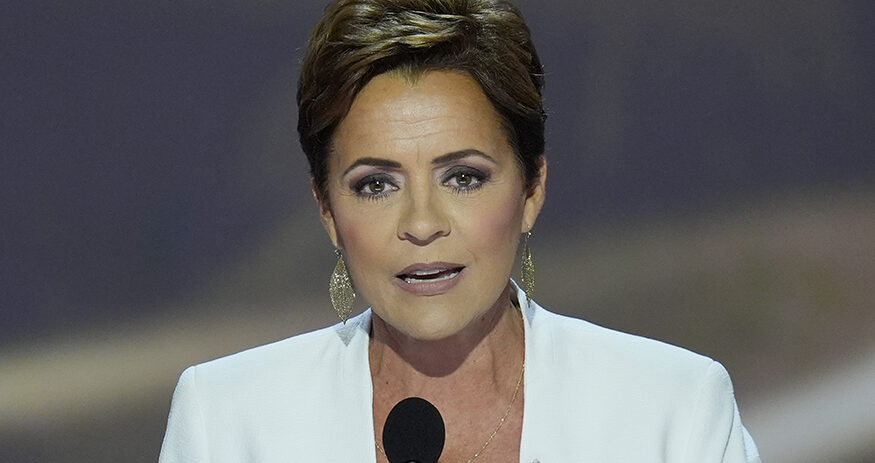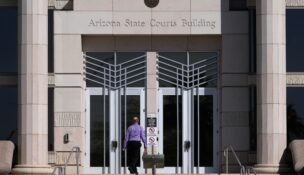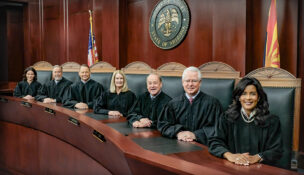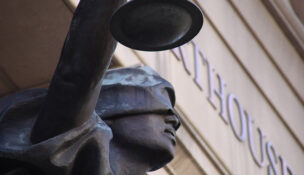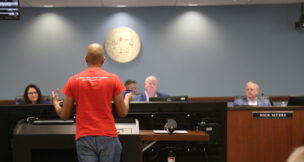Lake, Richer settle defamation suit
Howard Fischer, Capitol Media Services//November 18, 2024//
Stephen Richer has settled his defamation lawsuit against Kari Lake.
The agreement comes eight months after Lake conceded in legal papers she had, in fact, made false statements about the Maricopa County recorder and the way he conducted the 2022 gubernatorial race that she lost to Katie Hobbs.

Despite that, Lake and her husband, Bruce Halperin, continued to argue that they did not owe Richer anything – or at least very little -– saying that there was no evidence he actually was harmed.
No details were released. But an attorney involved in the case confirmed it was resolved on mutually agreeable terms.
In her March filing in Maricopa County Superior Court, Lake effectively defaulted on the lawsuit, acknowledging everything that Richer first alleged.
That specifically included that she knew it was false when she claimed he had “sabotaged” the 2022 election by having ballots printed in the wrong size so they would not be read by on-site tabulators. Lake also acknowledged that she knew it was false when she claimed that Richer illegally inserted more than 300,000 phony early ballots into the system.
But that did not end the litigation.
In a video statement at the time explaining her decision, Lake insisted her legal capitulation had nothing to do with her conceding that what she said was factually wrong – even if that’s exactly what was in the legal papers filed in Maricopa County Superior Court. Instead, she said it was a strategic move to allow her to focus her attention on her bid for the U.S. Senate.
“By participating in this lawsuit it would only serve to legitimize this perversion of our legal system and allow bad actors to interfere in our upcoming election,” Lake said.
As it turned out, Lake lost to Democrat Ruben Gallego by close to 80,000 votes.
Richer, for his part, said Lake’s March filing was a total victory for him and his fight to clear his name of the charges Lake made.
“It is now official that she accepts that all of that is a lie,” he told Capitol Media Services.
“She has been lying the entire time, we have told her she has been lying the entire time,” Richer said. And he said Lake knew she was lying because judges in other election cases she had filed challenging her loss had found there was no basis for either the claim that the ballots were deliberately mis-sized or that there had been fraudulent ballots inserted into the final count of the election that was won by Democrat Katie Hobbs by 17,117 votes.
“And now she officially will have a judgment entered against her for lying about me in connection with the 2022 election,” Richer said.
In filing suit last year, Richer said that Lake, her campaign, and the Save Arizona Fund, a political action committee which she has used to raise money, all acted with “actual malice.” That is crucial because, in general, people who are considered public figures like Richer cannot get a defamation judgment unless they prove by clear and convincing evidence that the person making the statement knew it to be false or that the statement was made with reckless disregard for the truth.
Lake initially sought to have the case thrown out, claiming that her comments were “mere rhetorical hyperbole” that were never meant as statements of fact. A trial judge rejected that assertion, a decision upheld earlier this year by the Arizona Supreme Court.
That left only two options for Lake: go to trial or concede. Richer said at the time that, based on Lake’s record in this case, he presumed she would choose the former.
“I thought, great, we’ll relitigate whether 2022 was stolen or not for the umpteenth time,” he told Capitol Media Services at the time. “But, apparently, she doesn’t want to do that.”
Lake, however, had a different explanation for her decision.
“It’s called lawfare: weaponizing the legal system to punish, impoverish and destroy political opponents,” she said.
Once Lake admitted liability, what that left was figuring out how much she owes Richer, something Lake wanted determined by a jury.
In legal filings, Tim La Sota, one of Lake’s attorneys, said the decision not to fight the defamation claim placed the burden on Richer to prove how he was harmed.
That, he said, included showing that any damage to Richer’s reputation was caused by anything Lake did or said. He argued there were plenty of other reasons the recorder suffered what he said in his complaint was a “decline in career prospects.”
For example, La Sota said, Richer had made comments about Donald Trump, at one point calling the former president “unhinged” for accusing the county of deleting an elections database.
Whatever the reason, Richer lost his bid for a new four-year term when he was defeated in the Republican primary by state Rep. Justin Heap. The Mesa Republican then won the general election over Democrat Tim Stringham.
But Richer also claimed actual expenses, like additional security for his home and family he said was necessary because of threats, including calls for their execution. Then there are the damages Richer said to his reputation.
And Daniel Maynard, his attorney, said in court filings there was also the aspect of “unjust enrichment.” That, he said, is based on the amount of money both her campaign and her political action committee took in each time Lake made one of her false statements and then used those statements to solicit donations on social media.
In filing suit, he pointed to a website for her political action committee that featured a six-minute video of Lake discussing the 2022 election and accusing Richer of intentionally sabotaging the election. The site also asked visitors to “donate to support Kari Lake and Save Arizona,” seeking donations from $25 to $100,000.
Maynard said at the time he believed that just between Dec. 5 and Dec. 24 she raised hundreds of thousands of dollars through the Save Arizona Fund. That was a period when the trial judge in a separate case Lake filed to challenge her election loss determined there was no evidence of fraud in the election. And Maynard said all the funds raised have been used to boost Lake’s political ambitions.
For example, Maynard said, the Save Arizona Fund paid for campaign events in Iowa where Lake had met with voters.
“That follows a prior pattern where Lake has told her supporters that fundraising money was needed to contest the election, but then spent the money raised on other items, including more than $35,000 on travel and hotel accommodations,” Maynard said.
There also was something else that could have paved the way for a settlement.
In admitting that she acted with actual malice, Lake opened herself up to having to pay punitive damages. These are awards designed not so much to compensate victims but to punish those who are liable.

